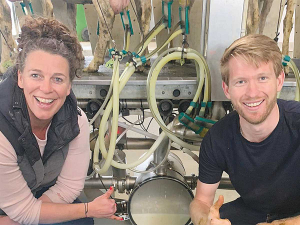Maui Milk achieves grass-fed certification in NZ
Sheep milk processor Maui Milk has achieved grass-fed certification of milk supply against the AsureQuality Grass-Fed Scheme.
 CEO Leah Davey and Business Manager Tom Woutersen pleased to see milk flowing on a new Waikato conversion.
CEO Leah Davey and Business Manager Tom Woutersen pleased to see milk flowing on a new Waikato conversion.
Sheep milk company Maui Milk is looking for new farmer suppliers as demand soars.
The company has taken on four new independent suppliers in Waikato this season to complement milk from its own farms.
Maui Milk general manager operations Peter Gatley says the company needs a lot more milk to satisfy demand from sheep infant formula customers.
One of the new conversions is a greenfield site development on a sheep farm; others involve fitting out existing herringbone sheds on dairy farms.
Gatley says the dairy farm conversion model, located within an hour’s drive of the powder plant at Innovation Park, is expected to be the backbone of industry growth.
He points out that there are 3800 dairy farms in the Waikato, with most able to incorporate sheep milking.
“Even the smaller ones have sufficient scale for sheep milking. They have a lot of milking infrastructure suitable for dairy and sheep – topography, fertility, small paddocks, races, water and effluent system,” he told Rural News.
“You can milk your cows in autumn and have the ewes underway in spring.”
Gatley said there are many reasons for farmers to consider the change.
Payout is based on total milk solids and equates to about $3/litre.
“At 15 to 20 ewes per ha, and 200 to 300 litres per ewe, even the lower end of the scale exceeds milk income from cow dairy,” he claims. “Farmers like the stability of pricing on rolling three-year contracts.”
Not surprisingly, environmental challenges feature strongly in thinking. Overseer calculations generally show sheep milking to have a considerably lighter footprint than cow dairy.
Gatley says some farmers see parallels with goat milking in terms of both financial and environmental issues, but sheep milking enables them to capitalise on their experience in pastoral farming, without the need to tie up capital in barns and machinery.
Shares are not required either, but supply rights will be assigned to protect the interests of early adopters.
Gatley says succession planning is a big factor in some of the conversions, with the new generation happy to innovate and drive rapid productivity improvement while supplying an ultra-premium product category.
He says interest is also being expressed by those seeking a foot in the door via equity partnerships or sharemilking agreements.
Tom Woutersen, Maui Milk manager responsible for new supply, says there are some very capable young farmers looking to sheep dairy as a possible route to farm ownership.
“We also know there are a lot of farm owners nearing retirement age. Some want to retain an interest in the farm but recognise it’s time for someone else to take over the day to day management.
“We’re happy to match those with the makings of a good team”.
New Maui chief executive Leah Davey joined the company from a multi-national ingredients supplier to the infant formula industry. She recalls she immediately saw the opportunity.
“The international market is huge and growing, but all of the big players are looking for a point of difference,” she says.
“A2 and the goat product have shown the way but now we have something that ticks every box for the demanding high-end consumer. In its natural form sheep milk contains about 50% more nutrient than cow or goat milk.
“Like goat milk it is easy to digest, but it has better flavour, and it’s free-range and pasture fed.
“All lambs are reared, and many are reared on their mothers. Consumers love this concept and it has a lot of appeal to farmers too.”
New Zealand and Chile have signed a new arrangement designed to boost agricultural cooperation and drive sector success.
New DairyNZ research will help farmers mitigate the impacts of heat stress on herds in high-risk regions of the country.
Budou are being picked now in Bridge Pā, the most intense and exciting time of the year for the Greencollar team – and the harvest of the finest eating grapes is weeks earlier than expected.
The Real Estate Institute of New Zealand (REINZ) has released its latest rural property report, providing a detailed view of New Zealand’s rural real estate market for the 12 months ending December 2025.
Rural retailer Farmlands has released it's latest round of half-year results, labeling it as evidence that its five-year strategy is delivering on financial performance and better value for members.
OPINION: "We are back to where we were a year ago," according to a leading banking analyst in the UK, referring to US president Donald Trump's latest imposition of a global 10% tariff on all exports into the US.

OPINION: A mate of yours truly reckons rural Manawatu families are the latest to suffer under what he calls the…
OPINION: If old Winston Peters thinks building trade relations with new nations, such as India, isn't a necessary investment in…